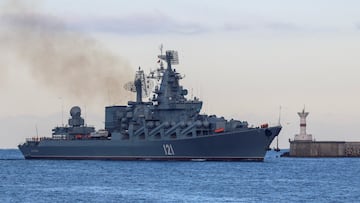Did Ukrainian forces blow up the Moskva, a Russian warship full of ammunition?
Reports say Ukraine used a Neptune missile to sink the Black Sea Fleet’s flagship, a missile cruiser. Russia claims the damage was caused by a fire onboard.


On Wednesday, 13 April, the Russian military reported that one of its largest warships, the Moskva Project 1164 missile cruiser, suffered “severe damage” after ammunition exploded onboard.
The Moskva is the largest warship in Russia’s Black Sea fleet, and the incident could form a pivotal moment in the conflict.
All Russian reports have yet to acknowledge any mention of a Ukrainian strike causing the large fire on board.
Russian Navy Confirms Severe Damage to Black Sea Cruiser Moskva, Crew Abandoned Ship - USNI Newshttps://t.co/m0YycCXsKC pic.twitter.com/5yuPwNy9VO
— U.S. Naval Institute (@NavalInstitute) April 14, 2022
Maksym Marchenko, the Govenor of Odesa, one of Ukraine’s regions that border the Black Sea, said that at least two Neptune anti-ship missiles had hit that ship. These claims have not been independently verified, but images of the fire have led some to claim that the ship has sunk after being flipped on its side.
Related: Putin’s strange gesture during ministerial meeting deciphered
The ship, a Soviet-era vessel, with missile launching capabilities, was reportedly armed with 16 anti-ship ‘Vulkan’ cruise missiles, which may have not been able to protect it from a Ukrainian attack. If Ukrainian Neptune missiles did strike the ship, Russia might be trying to hide a colossal military failure.
Some following the events on Twitter have warned that if the hundreds of sailors on board were not able to evacuate many may have been killed, making the strike a possible mass casualty event for the Russians.
The Moskva has a crew of 510, so this could be worst mass casualty producing event of the war. 6/
— Rob Lee (@RALee85) April 14, 2022
The ship gained notoriety after Ukrainian forces on Snake Island were asked by the sailors to surrender, to which those on the island responded saying “go fuck yourself.” Gov. Marchenko referred to the event by saying, “It has been confirmed that the missile cruiser Moskva today went exactly where the border guards on Snake Island told it to go.”
Can Russia bring more ships to the Black Sea?
A concern for the Russian military will be getting more air and naval support into the Black Sea after the incident. In mid-March, Turkey implemented a blockade on both the Bosporus and Dardanelles Straits after being asked by Ukrainian President Zelensky.
Related stories
Under Article 19 of the 1936 Montreux Convention, Turkey has the power to cut off access to these waterways to belligerent countries. After implementing the ban, Turkish Foreign Minister Mevlut Cavusoglu spoke with US Secretary of State Anthony Bliken and said that the country had “notified all riparian and non-riparian countries of the Black Sea not to send their warships to pass through our straits.”
If the Russian navy cannot bring in other warships to the Black Sea, many other vessels that form part of the fleet could be vulnerable to similar attacks.

